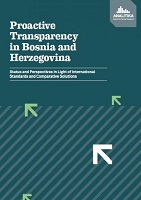Proactive Transparency in Bosnia and Herzegovina: Status and Perspectives in Light of International Standards and Comparative Solutions
Proactive Transparency in Bosnia and Herzegovina: Status and Perspectives in Light of International Standards and Comparative Solutions
Author(s): Alen Rajko
Contributor(s): Edin Hodžić (Editor), Mirela Rožajac-Zulčić (Editor), Selma Milovanović (Translator)
Subject(s): Politics, Information Architecture, Public Administration, Public Law, Corruption - Transparency - Anti-Corruption
Published by: Analitika – Centar za društvena istraživanja
Keywords: BiH; transparency; status; perspectives; international standards; comparative solutions; legislation; Finland; Hungary; information access;
Summary/Abstract: In order to effectively exercise the right to access public sector information, it is not enough to regulate and implement its reactionary segment (acting on individual requests for access), but to do so with respect to the proactive dimension of the right to access information. The proactive dimension of this right is reflected in the continued unprompted disclosure of certain categories of information in the possession of public authorities, which makes such information easily accessible to the general public. Thus, proactive transparency offers a range of benefits, for persons authorized to access information and public authorities alike, while simultaneously reducing the possibility of corruption and other deviations. Hence the standardization of proactive measures is an important part of the role of a modern state in a democratic society. Much like a medal with two sides, the right to access information has two inseparable faces: reactive and proactive. The proactive dimension of the right to access information usually encompasses the obligation of unprompted disclosure of certain types of information on a public authority’s website, regulating the required standard of consultation with the interested public in the process of public authorities’ decision-making and the minimal level of informing the public about the meetings of those authorities. The aforementioned comes with the requirements of accuracy, relevance, completeness, promptness and intelligibility of published information and the relevant technical and other standards, while the supporting functionalities are also useful – for example, setting up a centralized information registry and a central information and documentational service. Internationally, the current phase of development of the right to access information, including its proactive segment, is characterized by accepting proactive measures as an inseparable part of the modern regulation of the right to access information, a gradual stepping away from soft law towards legally binding documents, a reinterpretation of classically-codified provisions in favor of exercising the right to access information, standardizing the lowest common denominator of the contents of proactive measures, as well as the harmonization of certain elements of the state legislation in numerous European states, including states neighboring Bosnia and Herzegovina. Bosnia and Herzegovina was the first state in the region to legislate the right of access to information. However, the Bosnian-Herzegovinian legislation in this area lags behind international standards and does not follow other states’ advanced solutions with respect to the right of access to information. Freedom of access to information laws in Bosnia and Herzegovina regulate only the reactive dimension of this right – the disclosure of information on request, while the proactive dimension of the right to access information is completely neglected by those laws. Besides, the aforementioned legislature is fragmented and incoherent, does not contain adequate legal protection with respect to the implementation of proactive measures, while this area is partly regulated by acts which are not at the required level in the hierarchy of sources of law. This study should provide some answers to the question of how Bosnia and Herzegovina can catch up with the standards and practice which have developed in this area in the meantime. Hence the following text presents in detail international standards and other states’ positive practice in the domain of legislation and the institutional framework of proactive transparency, as well as analyzing the relevant regulations in Bosnia and Herzegovina and establishing their fundamental flaws. Recommendations to legislators and other stakeholders in this area conclude the study.
- E-ISBN-13: 978-9958-1922-6-5
- Print-ISBN-13: 978-9958-1922-6-5
- Page Count: 52
- Publication Year: 2014
- Language: English
- eBook-PDF
- Table of Content
- Introduction
- Sample-PDF

